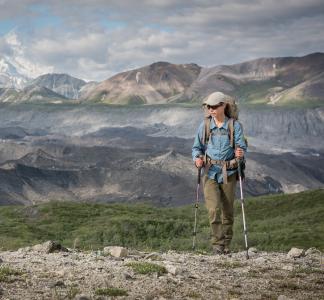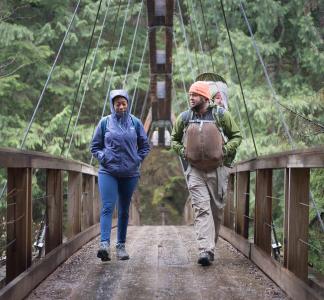4 top conservation issues facing new Interior Secretary Doug Burgum

North Dakota Gov. Doug Burgum
Gage Skidmore, Flickr
Among priorities: Rejecting public lands sell-offs, defending monuments
The Senate recently confirmed Doug Burgum to be the new secretary of the Interior. He is now charged with overseeing the Department of the Interior and the agencies charged with protecting wildlife habitat, advancing natural sciences and ensuring the interests of Indigenous people. The Wilderness Society calls on Secretary Burgum to steward 640 million acres of the nation’s public lands with conservation as a north star.
Secretary Burgum's job is to make choices between political agendas and sound stewardship of natural resources. This is the test of responsible governance under federal land management law. In taking the oath to “faithfully discharge the duties of the office,” he is committing to ensure the U.S. has healthy, resilient public lands and the world-class hunting, fishing and tourist opportunities that come with them.
We call on Secretary Burgum to:
✓ Reject public land seizures and sell-offs
Under Gov. Burgum’s leadership, North Dakota’s attorney general filed an amicus brief in support of a lawsuit by the state of Utah that sought to take 18.5 million acres of BLM lands away from the shared national management. The Supreme Court declined to hear the case, but it is likely that similar “public lands takeover” attempts will be ascendant in the next few years, as evidenced by the House’s recent passage of a rules package with language that makes it easier to sell off public lands. Public lands seizures and sell-offs have been consistently unpopular among people in the U.S. They are expensive for states, likely to reduce access to hunting and fishing areas and would almost invariably result in damage to habitat and cultural sites. Secretary Burgum must reject this land-seizure and sell-off movement and affirm that he shares the American public’s interest in seeing public lands stay public.
✓ Uphold conservation as a pillar of how we use public lands
Secretary Burgum must uphold the Interior Department’s conservation mandate. Burgum was among a group of governors who opposed the wildly popular goal of protecting 30% of U.S. lands and waters by 2030. Since Burgum was nominated, he has acknowledged a close working relationship with Department of Energy nominee (and oil company CEO) Chris Wright, raising concerns that fossil fuel development will be the dominant use of public lands under his watch. Moreover, early actions by the Trump administration have celebrated the president’s goal of increasing oil and gas drilling on public lands and ensuring U.S. “energy dominance.” Secretary Burgum must champion balanced management of public lands that includes a strong conservation pillar.
✓ Defend national monuments and the Antiquities Act
Secretary Burgum has expressed admiration for President Theodore Roosevelt, who signed the Antiquities Act into law and was a giant figure in the history of public lands conservation. Polling has shown that protecting national monuments using that law is extremely popular. During the Senate Energy Committee’s recent hearing, Burgum failed to commit to maintaining the existing boundaries of national monuments including those finalized under the Biden administration. To live up to the conservation legacy of Teddy Roosevelt, Secretary Burgum must stand up for Bears Ears and other national monuments as well as the letter and spirit of the Antiquities Act itself.
✓ Support responsible development of renewable energy on public lands
Our public lands should be a platform for renewable energy innovation and American jobs. Under the Biden administration, the Department of the Interior took several important steps on that front, including releasing a rule to reduce rents and fees for renewable energy projects on public lands; issuing an updated plan to guide responsible utility-scale solar development across BLM lands in 11 Western states; and investing in the BLM workforce to rebuild capacity and institutional knowledge lost during Trump’s first tumultuous presidency. To his credit, Burgum has regularly advocated for technological solutions to help the U.S. adapt to the effects of climate change, and even set a goal for North Dakota to become carbon neutral. During the Senate Energy hearing he said the U.S. needs “all forms of electricity, and we need more of it in the very near term.” Secretary Burgum must invest in staff, programs and incentives that promote responsible solar, geothermal and wind energy on public lands.

Theodore Roosevelt National Park, North Dakota
Justin Meissen, Flickr



